Yarn Bowl for Barbara Crouchley Dec 2022
Started with a log of unknwn species.
Bark inclusion left for interest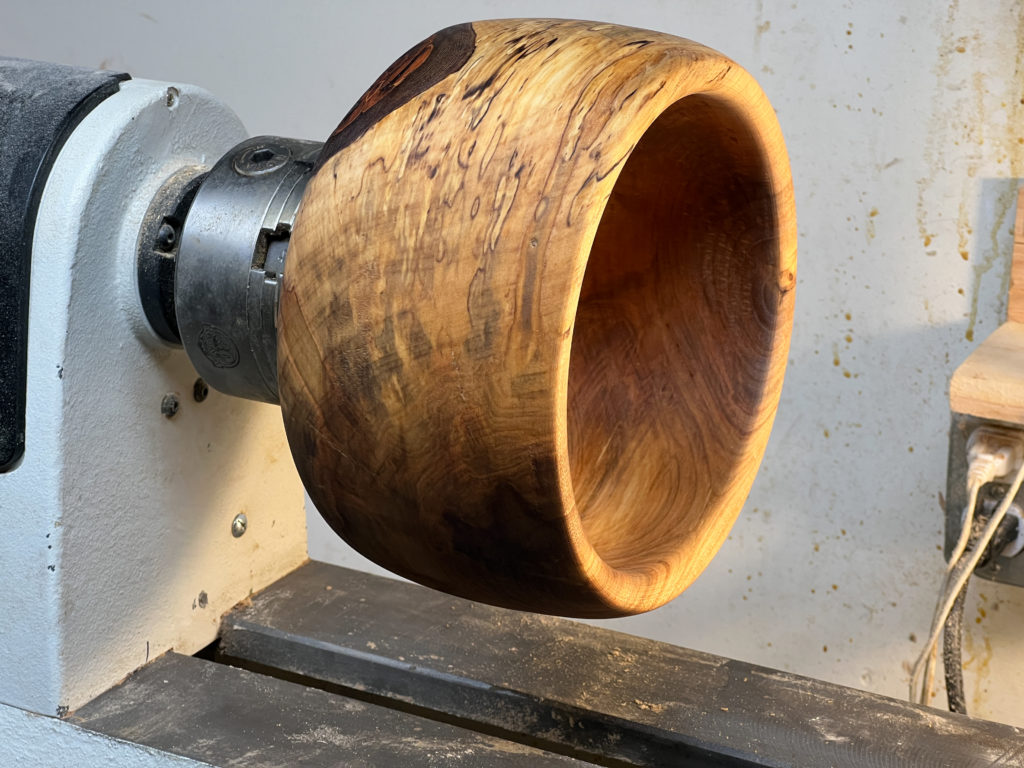
A curl cut with a coping saw to accommodate the yarn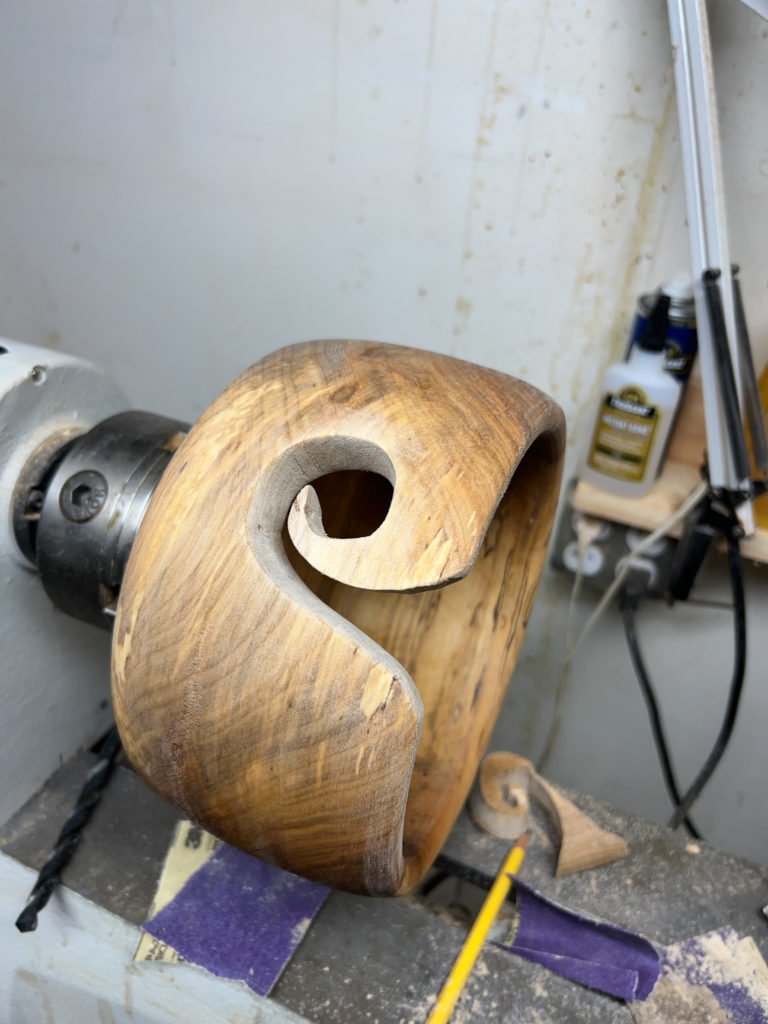
Finished after cutting off the tenon on the bottom.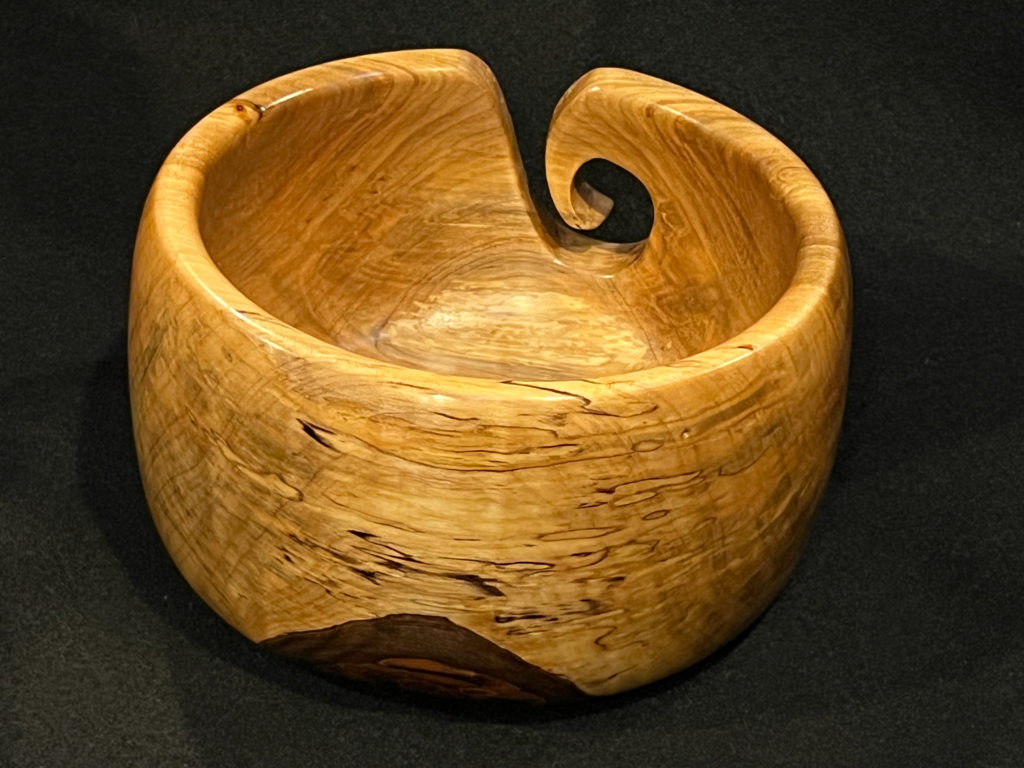
Yarn Bowl for Barbara Crouchley Dec 2022
Started with a log of unknwn species.
Bark inclusion left for interest
A curl cut with a coping saw to accommodate the yarn
Finished after cutting off the tenon on the bottom.
I nipped a small locust log from John Kauer and turned an end grain vase out of it using a stainless steel insert.
Shaped the outside a little, and drilled a hole, and turned out the inside in a taper (using a Oneway "Termite" ring tool) to accomodate the stainless steel insert,
Made a tapered jam chuck from a piece of firewood to hold the vase while I turned off the tenon on the base.
This table is poplar from the wood harvested from the tree that totaled the car back in 2013.
Pieces were hand planed for thicknesss and jointing. The legs were each cut (see below) from a 1 1/2" by 1 1/2" by 18" piece of poplar (same dimensions as the legs on the cherry table)
the apron was put together with rabbet joints that were hidden inside the legs
The top was held in alignment with two dowels, but not glued. The top was fastened to the apron with figure "8" tabs to allow seasonal movement of the wood.
The legs were glued up with epoxy after having been cut (see below) into quarters from the 1 1/2" x 1 1/2" by 18" square legs.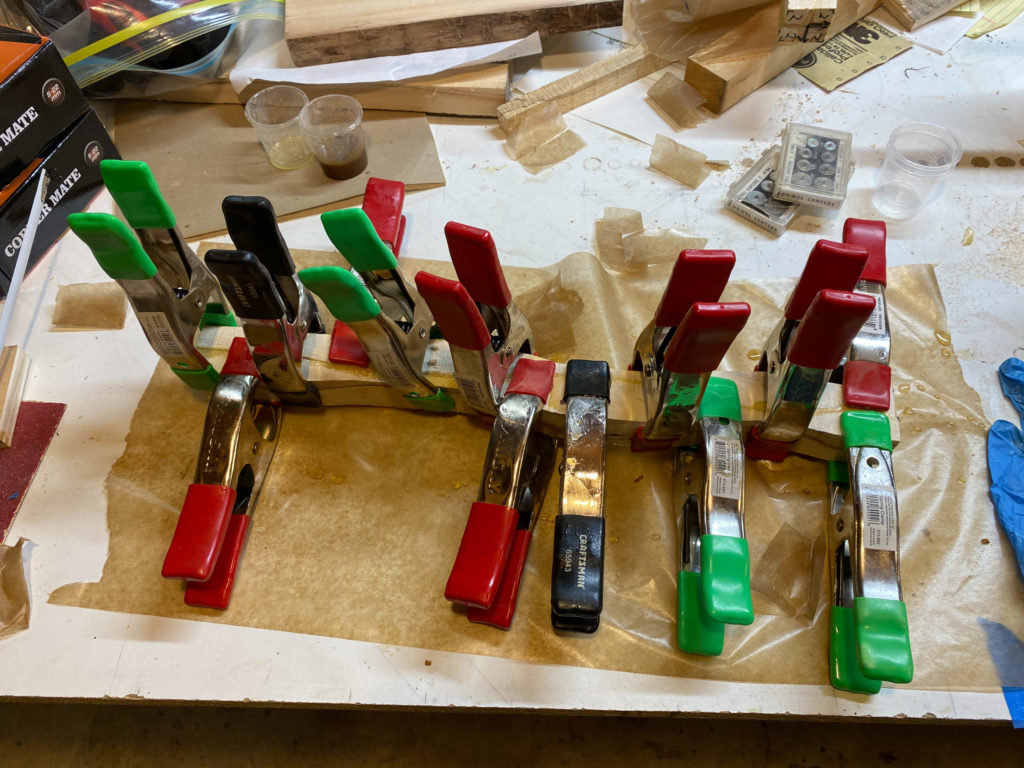 after sanding the excess glue away and prepared for finish by sanding to 320 grit.
after sanding the excess glue away and prepared for finish by sanding to 320 grit.
Here is a link to the technique I used to cut the legs: https://www.youtube.com/watch?v=c3YwNr00juY
The rabbeted joints were hidden inside the tops of the legs.
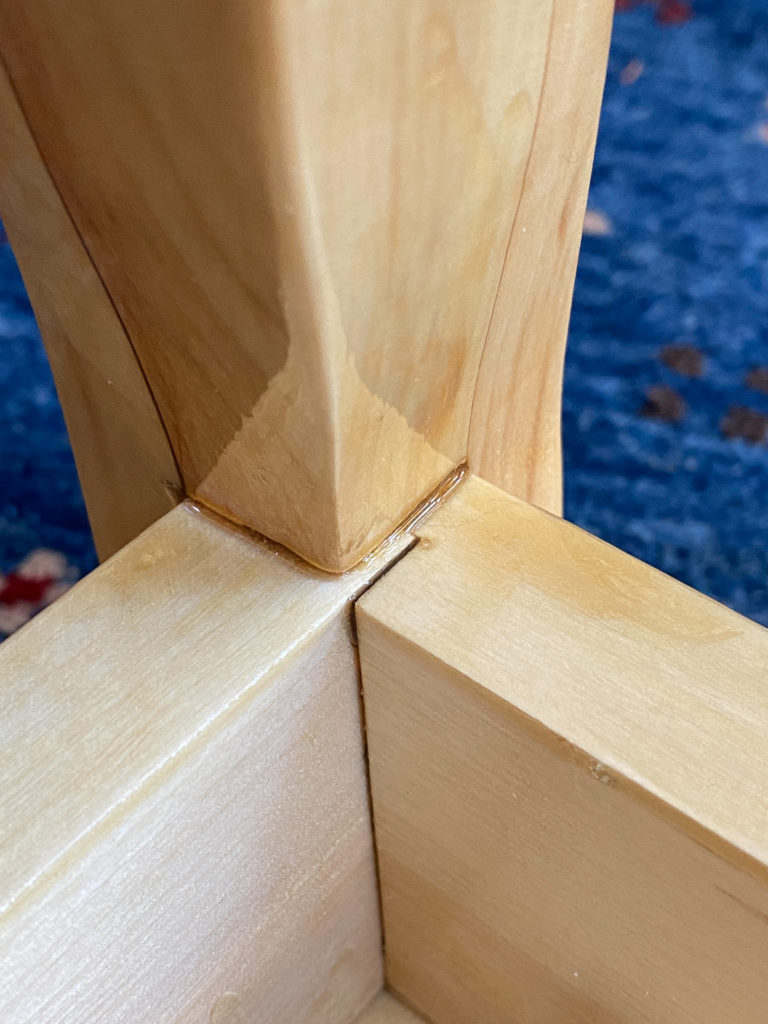 and the top fastened using the figure 8 tabs with 3/4" screws. The primer coats were one coat of SealCoat dewaxed shellac followed by two coats of Total Boat sealer. Then the table was finished off with 6 coats of Total Boat Gleam 2.0 spar varnish. Table will see outdoor use.
and the top fastened using the figure 8 tabs with 3/4" screws. The primer coats were one coat of SealCoat dewaxed shellac followed by two coats of Total Boat sealer. Then the table was finished off with 6 coats of Total Boat Gleam 2.0 spar varnish. Table will see outdoor use.
This cherry end table was made from boards milled with a Woodmizer saw mill of John Kauer's from logs given to me by Preston Hensley. (H: 19" Top: ~12 x 13")
The boards were cut to size and then hand planed for thickness and jointed for gluing the top. The apron was joined using hand cut mortises and router cut tenons.
The apron and legs were glued with epoxy. The top was attached to the apron with z-clips to alow for seasonal movement of the top.
The cherry logs were milled on John Kauer's Woodmizer mill, stickered and stacked about two years ago (2019).
Apple Bowl:
A joint effort with Bill Lahey. This was started by Bill in 2020 in our joint shop and I finished this up in March of 2021.
Finished with high build friction polish
Turn off the tenon and finish the bottom:
Final pix to come …
Plum burl from Lang Smith's Ancient plum tree.
This was rough turned some time ago:
see Plum Burl Bowl
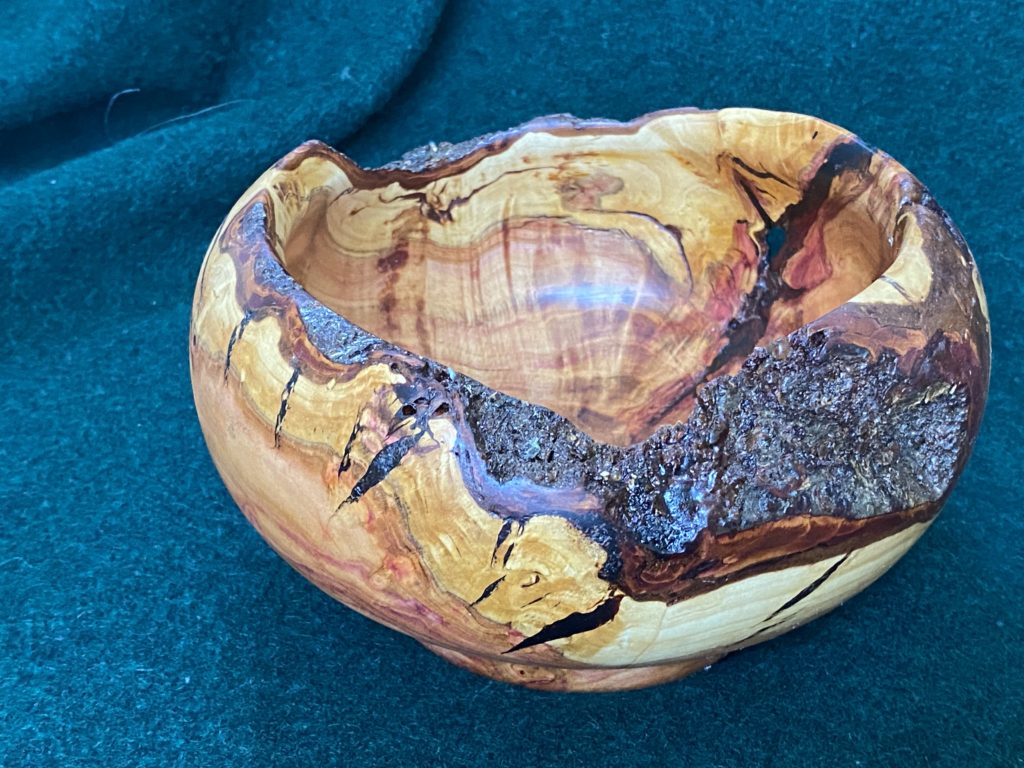 Cracks filled with coffe grounds and CA glue
Cracks filled with coffe grounds and CA glue
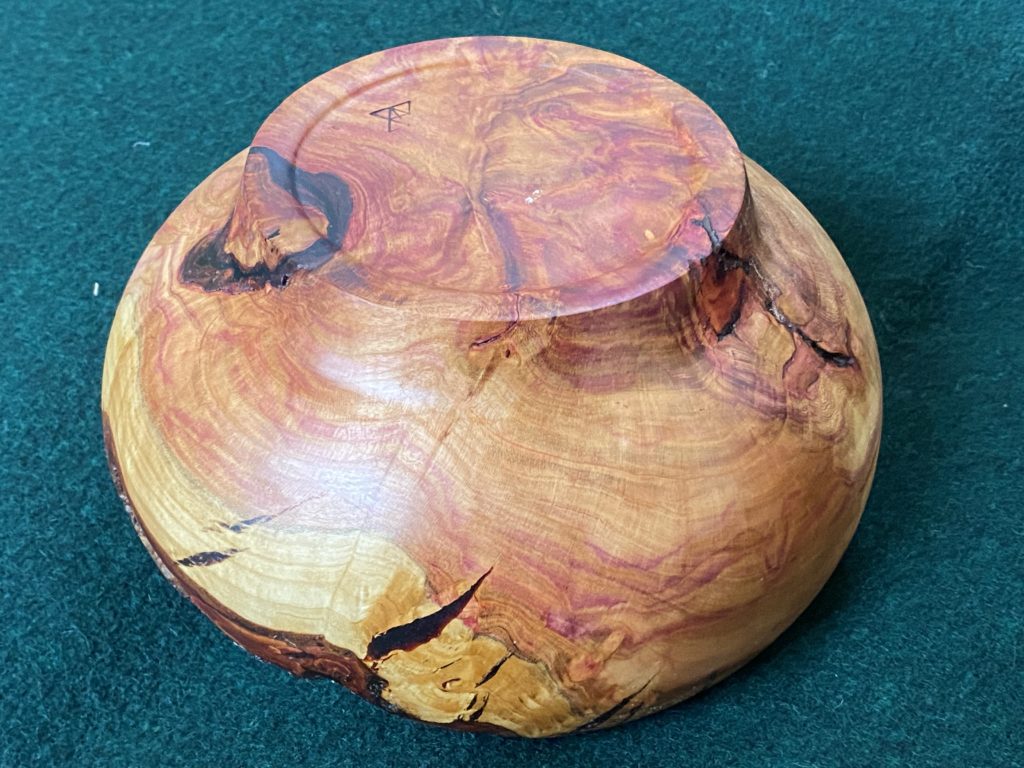 This piece broke out when rough turning it and was replced and bedded in expoxy with wood colored dye added.
This piece broke out when rough turning it and was replced and bedded in expoxy with wood colored dye added.
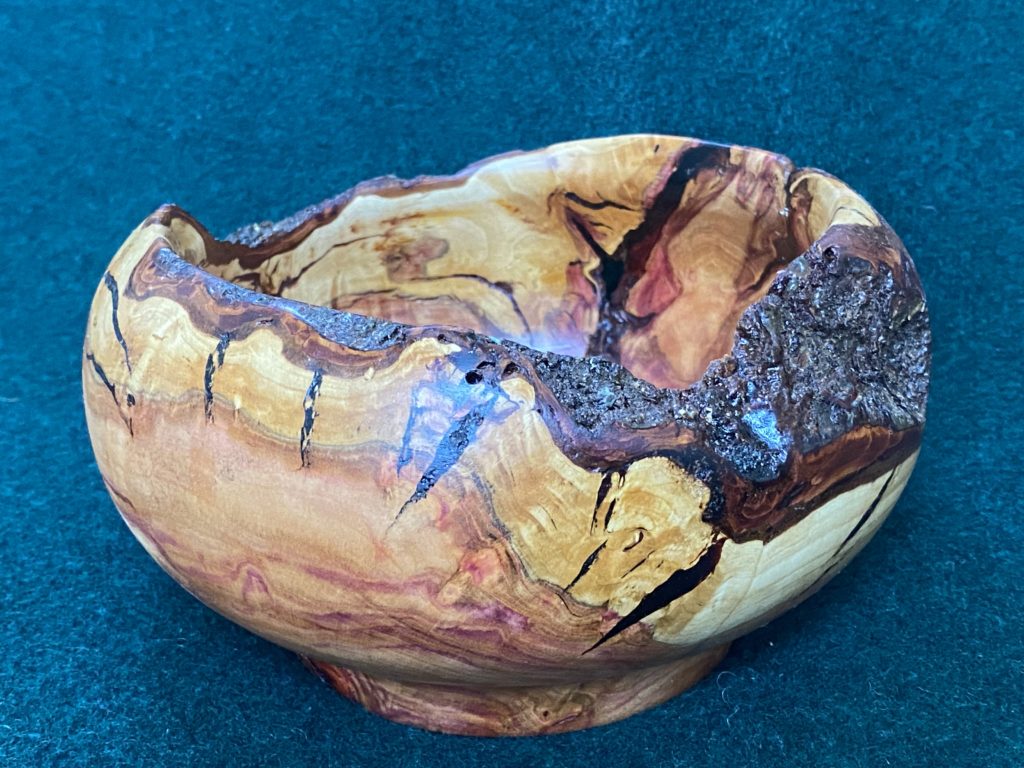 Wet sanded with walnut oil and then sealed with Zinzzer's SealCoat (dewaxed shellac) – two coats. Then finished with Crystal Coat an oil/alcohol/shellac mixture like High Build Friction Polish aka OB Shine Juice.
Wet sanded with walnut oil and then sealed with Zinzzer's SealCoat (dewaxed shellac) – two coats. Then finished with Crystal Coat an oil/alcohol/shellac mixture like High Build Friction Polish aka OB Shine Juice.
This birch bowl (10" x 3 1/2") was rought turned a couple of years ago and abandoned. I pulled out of the burn pile and repaired a ring check with CA glue and finished turning it.
Wet sanded with walnut oil (80-320), applied Zinzers SealCoat sanding sealer (two coats with sanding in between), and the after resanding to 320, applied several coats of High Build Friction Polish.
Cedar bowl (9" x 5 1/2") from a billet of old grow cedar from Roger Heinen:
This was going to be a yarn bowl but i couldn't bring myself to cut the channel for the yarn- the wood is so pretty.
Red oak bowl (11 1/4" x 4 1/2") – also rescued form the burn pile. This bowl was partially turned and then abondoned for a couple of years because of lage cracks that appeared as it dried.
I filled them with epoxy mixed with fillet that had a brown color almost matching the oak color.
these cracks went all the way through: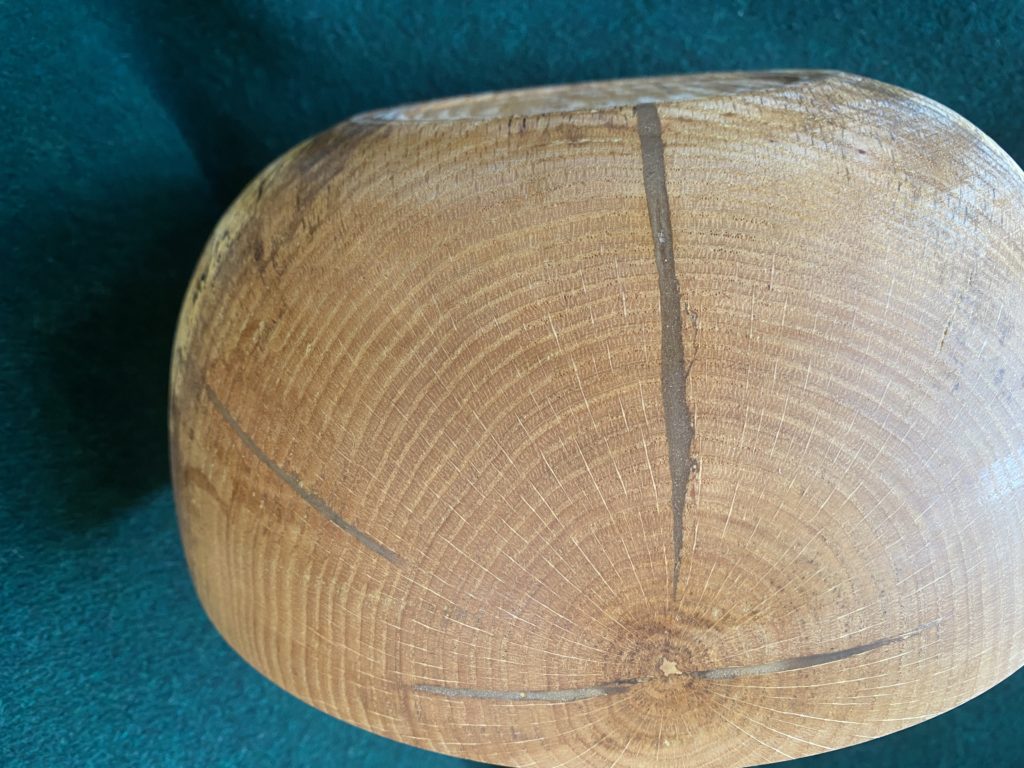 The cracks don't look great, but the bowl functions as a fruit bowl in the kitchen.:
The cracks don't look great, but the bowl functions as a fruit bowl in the kitchen.:
Oak Bowl from a log from Toby Nagurney
(7" x 2")
This log was from the other end of the crotch used in Bowl 3
See Oak Bowl (Jet 1220) [COVID-19 Bowl 3]
From a piece of firewood (species unknown)
Using a copper pipe fitting for the ferrule:

Finished with two coats of Watco Danish Oil
After I was done, I decided to add some detail to the handle. So I removed the bar and turned a conical head piece to hold the handle centered on the lathe.
Then I mounted the handle as shown. And with the diamond shaped carbide cutter, I cut small grooves in the handle, and then with a guitar string I burned the detail lines as shown:
Blow up of one end
Final result with re-assembled handle and bar. I took this opprotunity to drill out the hole a little more so that the bar would fit all the way into the handle.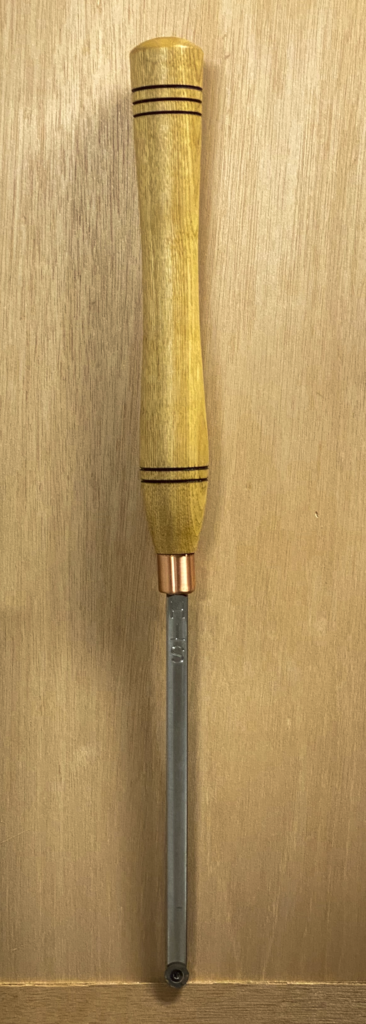
(Log was a gift from Toby Nagurney)
After turning the outside, had to deal with this split knot; the holes went all the way through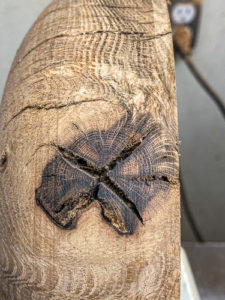
The knot and cracks were filled with a mixture of epoxy and coffee grounds – two applications – blue tape on the inside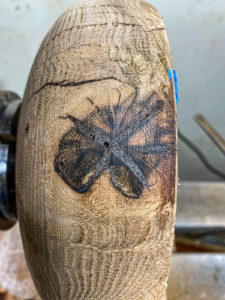
Final results: The knots came out great:
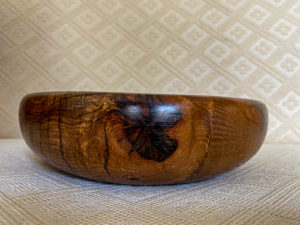
Finished with
1. Wet Sanded with Abranet 2" discs 80-320 grit with walnut oil.
2. Two coats of walnut oil (with 1 day wait after each coat)
3. Two coats of Watco Danish oil (plus one day await)
4. Mylands lacquer based sanding sealer …
5. Followed by 4-5 coats of Mylands High Build Friction Polish
Spalted Oak Bowl:
1. Wet sanding with Abranet 2" discs 80-320 grit and walnut oil.
2. MinWax water based sanding sealer (Two coats, sanding after each)
3. Walnut oil (2 coats) – (one day wait after each coat)
4. Watco Danish Oil (2 coats) (and 12 hour wait after second coat)
5. Myland's High Build Friction Polish. (4-5 coats)
Apple bowl turned on the Jet 1220 lathe (7 1/4" x 2 3/4")
Finished with Minwax water based sanding sealer, Mahoney's walnut oil, Watco Danish Oil, and Mylands High Build Friction polish.
Plum burl from Lang Smith's ancient plum tree:
A big piece of a knot flew off and had to be epoxied back in with West Systems G5 5 min epoxy with Transtint dye added.
After applying walnut oil
Hollow Form from Lang Smith's apple tree. (7" x 3 1/2")
Started out between centers, shaped the sides and turned a tenon on the bottom.
Then reverse mounted it in the four jaw scroll chuck.
Drilled out the center with a 2 1/4" Forstner bit to the final depth.
And used an EasyWood hollowing tool to remove most of the inside.
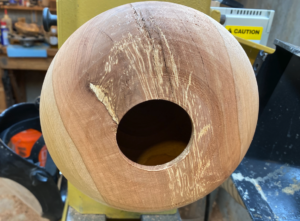 Finished and wet sanded by hand with Mahoney's Walnut Oil Utility Finish using Abranet 80-320 grits
Finished and wet sanded by hand with Mahoney's Walnut Oil Utility Finish using Abranet 80-320 grits
The bottom tenon was removed by reverse chucking the bowl by the hole in expansion mode:
Bottom after the tenon was removed. Sanded and finished.
then …
The bowl was mounted on a jam chuck that was made from a piece of poplar. The jam chuck was cut in a taper to mate the hole. A jam chuck was used so that I had complete access to apply the finish to the top area around the hole.
 and a "soft touch" was screwed to the live center on the tail piece to hold the bowl in place:
and a "soft touch" was screwed to the live center on the tail piece to hold the bowl in place:
Here's the result after applying the Hi-build friction polish:
This piece was inspired by Joel Gerber of Solana Beach, California.
On Septecber 11, 2013, a huge storm hit Islesboro and brought down over 2000 trees on the island.
We lost several including a large poplar tree that totalled our 1998 Honda.
What was left of the Honda. (It was salvaged with a new windshield, and we still drive it; it still has visible dents, but it runs fine. Makes for a good "island beater")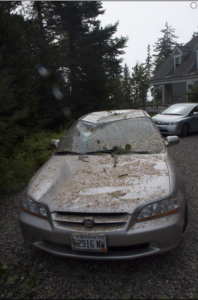
After sitting in the woods for a year (August, 2014), I decided to try milling the tree trunk into planks. My friend Preston has an Alaska Chainsaw Mill and so …
We milled the log into planks about 2 1/2" thick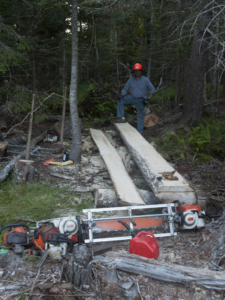
John Kauer pitched in too:
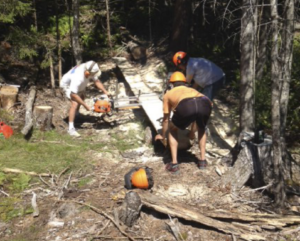 The planks were stacked and stickered:
The planks were stacked and stickered:
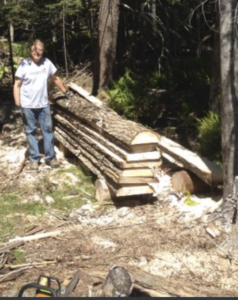 and allowed to season for a couple of years.
and allowed to season for a couple of years.
After a couple of years, every plank had split right down the middle of the pith, So I chainsaw ripped each plank into two boards, and then in 2018, I proceeded to resaw those lengthwise into 1 1/2" boards on the band saw to give me a bunch of book-matched, very rough boards of varying random thickness (+/-1/4")
The 2×4 was attached to give me a reference to the bandsaw table to keep the planks upright.
After another year – in 2018, I jointed the boards by hand with No. 5 and No. 4 hand planes. Then I glued up the book matched boards and hand planed them flat with the No. 5 mostly and also flattened with a number 7 Lie-Neilson jointer plane (What a beauty that thing is).
The top of the desk is about 60" by 27"and is made up of two pairs of bookmathed sections with an added natural edge board for the front side.
After cutting the top to length, 3 coats of boiled linseed oil followed by 5-6 coats of General Finishes Arm-R-Seal satin poly urethane applied with a rag.
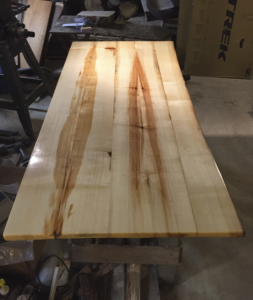
I discoved that I had an old table whose legs I could cannibalize. So I proceeded to dismantle the entire leg assembly and glue it all back together with epoxy.
After 3 coats of boiled linseed oil
After 6 coats of hand wiped General Finishes Arm-R-Seal Oil-poly Varnish
The log for this bowl came from Brandon and Sharon's Japaese Maple tree that was cut down in 2012.
This yarn bowl is a gift for Sandy Oliver.
Here's how I did this.
Mounted in the 4-jaw chuck after shaping between centers and cutting the tenon.
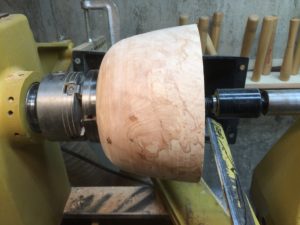 … other side showing the natural edge from a bark inclusion. I decided to leave this in as a feature.
… other side showing the natural edge from a bark inclusion. I decided to leave this in as a feature.
Ran into a defect in the insde that had to be filled with CA glue and sawdust to stabilize it.
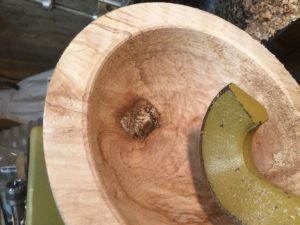
After thinning the walls, cutting the slot for the yarn, and applying a coat or two of Watco Natural Danish oil:
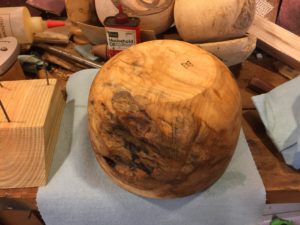
Another small bowl from firewood. Shallow bowl for holding small things at the sink. Very stable and very wide bottom section:
One of the first turings of mine on the new Cambridge MA joint shop set up with Bill Lahey.
Jet 1221 Lathe and Laguna 14/Twelve bandsaw.
This small bowl was turned from fire wood. Don't know which species but it is very close grained and hard.
Finsihed with walnut oil.
The Joint Cambridge Shop so far comprises the Jet 1221 Lathe and the Laguna 14/Twelve BAndsaw and a 8" slow speed grinder with CBN wheel and Wolverine Vari-Grind sharpening jig, and several carbide, bowl, and spindle gouges.